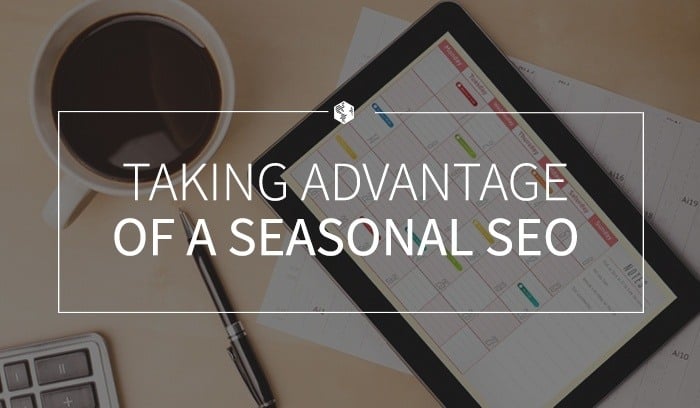Table Of Contents
Many businesses may focus primarily on ranking for general search terms to generate high-quality leads and high volumes of traffic year-round, but people often forget about the niches of seasonal traffic for which they can optimize. To maximize your outreach, you should try to take advantage of this often-overlooked means of gaining more attention for your brand.
What Exactly is Seasonal Traffic?
Before you can target for seasonal traffic, you should first understand what it is. Simply put, seasonal traffic is a pattern or occasional fluctuation correlating with specific seasons. Seasonal traffic reflects a temporary change in the way users interact with search engines, with several influences behind it.
Traffic During Holidays and Pre-holidays
Businesses should keep in mind that pre-holiday traffic is much more likely to spike rather than holiday traffic. Most people are doing their shopping in the days leading up to the holidays, with holidays such as Christmas likely causing traffic to increase up to two months prior.
Specific Sales Patterns
While B2C companies are more likely to make sales leading up to the holidays, B2B businesses tend to spend less time on sales during these periods, typically to close sales before the inconvenience of the holidays. The most active time for B2B sales falls around the beginning of the year, with new goals and budgets in place to prepare for the coming year.
Traffic Based on the Relevancy of Products and Services
Naturally, certain products and services will be more popular during specific seasons. For instance, if your company sells winter clothing or winter sports equipment, you’ll see traffic and sales increase for these items during the winter months. During other seasons when these items are less popular, companies can redirect their marketing efforts to other areas of their business.
Special Events and Trends
Apart from holidays and seasons, certain annual events or trends can influence the search for specific products or services. For instance, during the Super Bowl, many businesses might have deals on food or relevant products and additional relevant information. Taking advantage of large events like this to push your own business can result in sharp traffic and sales spikes.
There are many reasons why businesses are often unaware of the many opportunities there are to increase seasonal traffic, but here are some ways to make sure you don’t miss out.
Regularly Analyze Your Traffic Patterns
If you’re primarily focused on analyzing monthly traffic, ranking, and conversion reports, you might be neglecting to take a look at valuable data that a yearly report can provide. Looking over the whole year can give you a clearer picture of when your traffic spikes, helping you determine when you should market certain products or services throughout the year.
Google Analytics makes it easy to see yearly traffic and more information. Simply go to the Acquisition module and change the report date range to a year or longer. You’ll be able to see and recognize certain patterns based on the data collected.

Paying attention to traffic patterns may help, but don’t depend on these analytics alone, and instead pay more attention to audience behavior as well. You can view and analyze audience behavior by choosing the Ecommerce section and selecting Transactions. This will ultimately help you understand how people are interacting with your website during specific times of year.
Keep Areas of Opportunity in Mind
If you notice there are certain holiday months when traffic increases and then decreases, such as a greater number of visitors in April with Easter sales and yet a decrease in June or July, you should consider certain opportunities to increase the latter numbers.
For example, while you may have Easter and Christmas sales, maybe you’re neglecting to incorporate 4th of July sales, which could result in a larger number of visitors during June and July. Even if you’ve relied on patterns of seasonal traffic, you may be overlooking certain opportunities.
One of the best ways to discover new opportunities for which you can market is to make a list of seasonal events. You’ll need to have long-term planning in place to make sure you get the most out of your SEO marketing campaigns. Simply construct a list of popular holidays each year, and market accordingly as they approach.
In addition to traditional national holidays, you should also list any relevant sports events, expos, conferences, and regional holidays that could bring opportunities. To take full advantage of these times of year, you should plan to market for them within two to three months before they happen. You can also setup Google notifications to let you know when to initiate your marketing plans.
Make Use of Seasonal Keywords
Another mistake you may be making is underutilizing seasonal keywords that are relevant during certain times of the year. You should try to rank for season- and holiday-specific keywords if you can, apart from general short-tail and long-tail keywords.
The first step you can take is to look for good seasonal keywords using the Google Search Console, in the Search Query section of your account. Simply access the Search Traffic > Search Analytics section, check the Impressions box, and set the Dates filter for 90 days. Through this, you may immediately find some ideal seasonal keyword targets.
Brainstorm Appropriate Terms and Use Google Trends to Check Them
If you have a new website with little to no search history, it’s time to get started with some broad category terms that can help you determine the best related niches and topics to target.
Using Google Trends, you can see what kinds of search volume appears for holiday- or event-specific keywords such as “new years eve” that can provide you with some ideas. Wherever you see the spike begin to rise is when you should target your marketing plans to get the most from your campaigns.
Notice that the spike immediately drops following the holiday. You’ll want to withdraw your campaigns at this time.

Don’t Create New Pages for Seasonal SEO
One problem that many businesses create for themselves around the holidays is boosting new holiday-targeted pages. Developing and publishing a new page specifically for seasonal SEO will require more time to build up page authority, citations, links, and more. You may also risk creating and implementing duplicate content in your campaigns if you’re not careful, with many pages that are too similar.
Instead, you should focus on optimizing evergreen landing pages that already exist, further optimizing them to meet seasonal SEO needs.
If you want to enhance those evergreen landing pages to help you rank better for a certain holiday or event, there are a few tasks you’ll need to complete, including:
- Optimizing the pages for ideal, analyzed seasonal keywords
- Updating the year to be current
- Updating images, content, and videos
With each of these aspects optimized on your website, you can take advantage of those pages that have worked for you in the past, helping maintain their usefulness for many years to come. This can also take much less effort than creating a new page for all of your seasonal SEO campaigns.
Keep an Eye on the Competition
If you’re not careful, competitors can easily get ahead of you when you’re not paying attention. To avoid losing seasonal traffic and sales to competitors, you should analyze their SEO as much as yours.
One way to stay a step ahead of competitors is to create Google alerts for the seasonal keywords you want to target. In doing this, you can make sure that you’re aware of any uses of keywords you want to rank for, and see what your competitors are doing to show up for them.
You can also track competitors’ keywords using tools such as SEO Powersuite’s Rank Tracker, with the ability to add as many competitor domains as you want.
Next, you can subscribe to competitors’ email updates, which can further keep you updated every time they push a holiday sale or offer.
Taking these steps to monitor your competitors and adapt your campaign accordingly can help ensure that you don’t fall behind.
Get the Most Out of Seasonal SEO Campaigns
Seasonal SEO won’t necessarily be the easiest method for gaining additional traffic and sales during the holidays, particularly if you start your campaigns late or experience high competition. On the other hand, you can still succeed in making the most of the holidays if you invest enough time and effort on optimizing for specific seasons and events.
With the right strategy, each season can play a bigger role in helping you boost traffic and sales in the long-term.






